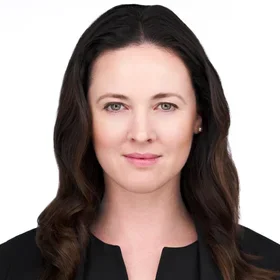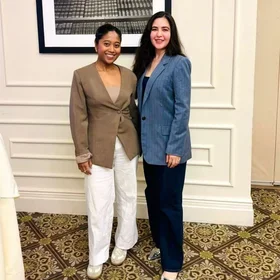Xiaolin Sun has had a passion for the fine arts since he was child. In his sophomore year of college, Sun became awe inspired by the ways in which technology had managed to restore and preserve Chinese cultural artifacts, sparking his interest in researching the textiles of East Asia’s ethnic minority groups.
But before he pursued an advanced degree, Sun sought to strengthen his oral and written English and earn competitive TOEFL scores. That led him to Columbia University’s American Language Program; Sun enrolled in the Intensive Academic English Program for three terms and the Advanced Academic Preparation course over a summer. Now, right on the heels of earning an M.A., Sun will continue his academic journey next month at the University of Nottingham, where he will pursue a Ph.D. in Culture Studies to examine how digitization technologies can create integrated representations of ethnic textiles in museums. For Sun, the ALP was a key stepping stone to getting there. He recently spoke about his experience at Columbia and what’s next in his career.
Why did you enroll in the ALP at Columbia, specifically?
I enrolled in Columbia University’s American Language Program for three semesters to prepare for studying at the graduate level. My exposure to the art world came at a young age – both of my parents are professors at the Sichuan Fine Arts Institute in Chongqing, China. As a child, I accompanied my father to Chongqing’s Dazu Rock Carvings, where he was engaged in restoration efforts. Observing the extraordinarily labor-intensive restoration processes ultimately led me to consider more efficient alternatives to preservation. At the time, since the robust digital technologies used today were still in their infancy, this question remained unanswered for a while.
Based on my growing interest in artistic production and practice, I attended the Sichuan Fine Arts Institute as an undergraduate. My studies were focused on art history. During my sophomore year in college, I came across the exhibition, Echoes of The Past: The Buddhist Cave Temples of Xiangtangshan, developed by the University of Chicago. This exhibition creates a virtual experience for visitors to imagine how these sacred spaces – contents from which have been removed to foreign museums – appeared in the past. I was intrigued at how manual reconstruction and preservation were being replaced by digital technologies' rapid progress, strengthening my determination to study abroad to learn frontier digital methodology and cultural heritage object protection technologies. However, I studied only basic English, which had proven to be a significant challenge.
The most memorable part of the ALP was the Language Exchange Program. This program helped me to make my first American friend... The first time I tried Vietnamese food was with him."
When did you start and end the ALP? Which specific program(s) did you enroll in?
I started the American Language Program in Spring 2017, enrolling in the Intensive Academic English Program for three semesters. In the beginning, I was assigned to level 4. After three semesters, I made significant progress in my English. I was promoted to level 6 by the end. In Summer 2018, I also took the Advanced Academic Preparation course to prepare for my master's studies. The course focused on academic writing skills and research skills. I led a seminar and participated in other students’ seminars to improve my discussion skills.
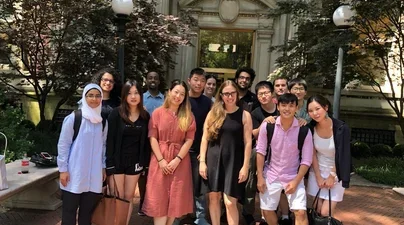
(Pictured, above) Xiaolin took the Advanced Academic Preparation course in Summer 2018 to hone his writing and research skills. Xiaolin takes a photo with his classmates and Brittany Ober, Lecturer in Language in the ALP.
Which aspects of the ALP were most memorable?
The most memorable part of the ALP was the Language Exchange Program. This program helped me to make my first American friend. My language partner was Kenneth Taing, a student in the School of General Studies majoring in English. He is friendly and engaging. At the time, he was learning Chinese, so we met twice a week. Sometimes we met at the library to discuss designated topics, including music and bands or culture and customs. We also explored New York City together. Because I grew up in an artistic family and my undergraduate training was in art history, we went to the Metropolitan Museum of Art and the Museum of Modern Art to enjoy artistic works from different periods. He took me to taste cuisine from around the world. The first time I tried Vietnamese food was with him.
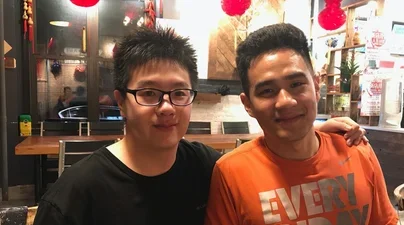
(Pictured, above) Xiaolin (left) and his language partner Kenneth Taing (right), an English major at Columbia’s School of General Studies, helped to strengthen each other’s conversational Chinese and English. In the process of conversing and exploring New York’s multicultural restaurants, they also became friends; the pair posed for a photo at the 108th Dried Hot Pot Schezuan restaurant.
I will never forget how nervous I was the first time I participated in the CU Speak public speaking student club. CU Speak is open to all Columbia students! And at that time, I could not speak English fluently. However, after I introduced my hometown, Chongqing, other students gave me warm applause, which gave me confidence."
What was it like to be on Columbia's campus and to experience New York City?
I will never forget how nervous I was the first time I participated in the CU Speak public speaking student club. CU Speak is open to all Columbia students! And at that time, I could not speak English fluently. However, after I introduced my hometown, Chongqing, other students gave me warm applause, which gave me confidence. Jana Quigley, the Assistant Director of the ALP Student Life, sent us some upcoming activities, including the Project Pengyou at the New Year Parade and Columbia basketball games. That was how I got involved on campus and made some friends who were also studying at Columbia University. I engaged in conversations with Columbia art history graduate students to gain a better understanding of the field. Columbia’s libraries are impressive. I took advantage of the wealth of resources available to me. Columbia students can get free admission to over thirty incredible museums in New York City! In my spare time, I visited as many art museums as I could.
As an international student, I had to take the TOEFL. It was a big challenge. Without the intensive, practical language learning environment of Columbia’s ALP, I could not get satisfactory scores."
How did the ALP strengthen your application for your master's degree and/ or Ph.D.?
As an international student, I had to take the TOEFL. It was a big challenge. Without the intensive, practical language learning environment of Columbia’s ALP, I could not get satisfactory scores. Studying through the American Language Program while living in New York City provided endless opportunities to communicate with others in English and to learn about cultures other than my own. At the time, I was applying for a master's degree. I received rejection letters from schools one after another, but finally was accepted by Loyola University Chicago, Pennsylvania State University, and Binghamton University. One of ALP professors, Brittany Ober, encouraged me by providing some perspective: choosing a school that suits you is more important than a high-ranking school. Ultimately, I chose to pursue a master’s at Loyola because it is a private university with a small student body; I benefited from close relationships with faculty members and peers.
How did you become interested in studying and preserving textiles created by ethnic minority groups from China? How do you plan to expand your research at the University of Nottingham?
During my time at Loyola, I worked as a research assistant for the May Weber Ethnographic Study Collection; the ethnic minority textiles I researched fascinated me. As cultural objects, textiles embody a cultural group's history and identity and afford insights into the aesthetic sensibilities, consumptive practices, everyday rhythms and rituals, cultural meanings, and symbolic practices of the ethnic community in focus. However, political movements, coupled with globalization, industrial modernization, and tourism in agricultural and subsistence societies, have shifted how people make, use, and understand traditional textiles. In addition, the structural composition of woven artifacts fashioned from organic materials is sensitive to deterioration. Over the past several decades, major museums and institutions have digitized their collections, making their artifacts more widely accessible while also supporting the conservation, future restoration, and contextualization of artifacts with respect to their original environments.
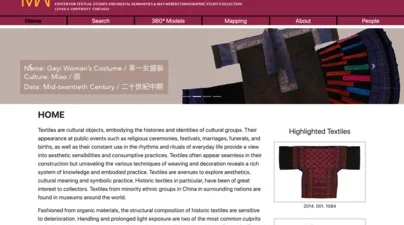
The screenshot above shows the homepage of Xiaolin’s East Asian Textiles master’s capstone project at Loyola University Chicago. Sun credits the ALP with not only helping to boost his TOEFL scores, but also with deepening his exposure to New York’s world renowned arts institutions: “Columbia students can get free admission to over thirty incredible museums in New York City!” He earned an M.A. in Digital Humanities in 2020 and begins pursuing a Ph.D. in 2021.
For my master’s capstone project, I initiated a digital humanities research project, East Asian Textiles. to prioritize the visual and overall formal dimensions of objects as well as their descriptive data or documentation. Digital exhibits tend to flatten or detract from the viewer’s full sensory experience of an artifact, especially its materiality so that continues to present a challenge. I will continue my academic training with Professor Eugene Ch’ng, who specializes in virtual reality and digital heritage, and Dr. Thomas Hirzel, a digital humanist at the University of Nottingham. As a student in the University of Nottingham’s doctoral program, I plan to investigate how digitization technologies can create integrated representations of ethnic textiles.
Do you have any advice for future students who might enroll in the ALP?
I would say, go for it! Studying through Columbia’s American Language Program is the first step of exploring the world. This program has many experienced instructors that will help students who want to achieve academic or professional success in the U.S. or abroad. The ALP not only provides English courses but also immerses you in the culture of this country. DON’T HESITATE! Columbia's community is diverse; by studying through the ALP, you can also participate in different activities and events to make friends from other countries.
